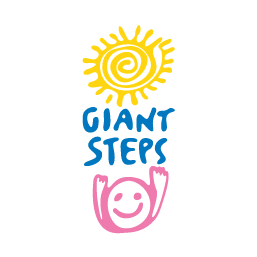Music Therapy
SYDNEY AND MELBOURNE
Music Therapy
SYDNEY AND MELBOURNE
Music therapy is a research-based practice and profession in which music is used to actively support people as they strive to improve their health, functioning and wellbeing.
Our approach
At Giant Steps, music therapists do this by collaborating with all members of the transdisciplinary team – teachers, occupational therapists, speech therapists, educators and families to empower everyone involved in the child’s life to access music for building relationships.
Most children are attracted to music, and children with autism especially so. What makes the experience of music unique, is how it stimulates multiple areas of the brain. The act of making music – singing, playing instruments, moving – activates even more areas, making it an effective medium for integrating the senses. This motivation for music means the music therapist is able to work on the foundational skill of simply staying involved with someone for increasing amounts of time. This ability to maintain connections is one of the building blocks for engagement and learning, and often one of the first steps in making social connections.
Music therapists use the structure of music to help keep anxiety low, by providing a predictable means of knowing what is expected. The use of music laid over sequences and instructions for daily tasks such as tying shoelaces, putting on sunscreen and brushing teeth have helped many students overcome sensory barriers to these kinds of activities. Across the school day, music is used by all staff to help keep students at their optimal arousal level for learning, through upbeat dance and movement, singing, playing preferred instruments or providing calming sensory input along with steady, simple melodies. As many people with autism can feel stressed by difficulties with sensory processing, comprehension and understanding the world around them, music can add experiences of pleasure and joy when they are most needed.
Social learning forms the foundation of the music therapy program, with a focus on skills such as social orientation, initiation, referencing, imitation, turn-taking, adjusting to coordinate with others, joint attention and emotional regulation. Focusing on an object, such as a musical instrument, can provide a less threatening means through which to begin imitating others and to jointly attend to the same experience. Research is now showing that the simple act of keeping a beat with others increases prosocial behaviour and social bonding with group members and play partners. Activities such as drumming together, dancing with a partner or playing an instrument alongside another, help students to enjoy being with others and to build trusting relationships for learning and friendship.
The music program at Giant Steps combines therapy with curriculum, believing that music therapy and music education are different, but complementary. Music therapists traditionally focus on developing social and communication skills through music, however the teaching of music skills to a student will also enable them to participate more fully in social music groups. Learning outcomes are met through music programs and carefully assessed across the school year. A typical music session might include activities such as: singing and voicework, playing instruments, dance and movement, improvisation, storytelling, song writing, relaxation and listening to different genres of music.
Each semester features a music style or multicultural theme. Festival days are coordinated with performing groups visiting the school, and these authentic experiences help to bring content to life. Giant Steps also believes in equal access to the arts and has established working relationships with key arts organisations. These include setting up the autism-friendly performances at the Sydney Opera House and now collaborating with the Art Gallery of NSW and the Australian Museum. These partnerships are opening up opportunities for students of all abilities to experience all the learning, creativity and sensory pleasure that the arts have to offer.

Bronte Arns
National Director of Music TherapyBA, PGDipMT, MMus (Res), RMT
Bronte Arns is a Registered Music Therapist and Director of Music Therapy at Giant Steps Australia.
Bronte’s research has focused on transdisciplinary practice, with a Masters completed through the University of Melbourne on factors shaping music therapy practice within this model. Bronte has held many roles within the Australian Music Therapy Association, including most recently, Secretary of the Board. Within Giant Steps, Bronte coordinated the development of the Recreation and Play Assessment used to assess social abilities and play-based development. As part of her role, Bronte oversees music projects, professional learning, events across the school and supervises practicum students from registered music therapy tertiary courses. Over the years, Bronte has presented a number of papers at conferences including APAC, the National AMTA Conference and the World Congress of Music Therapy. She is passionate about access for all students to the arts and opportunities for staff and students to use music for engagement, health and wellbeing.
Email:bronte.arns@giantsteps.net.au
Telephone:+61 2 9879 4971
SYDNEY TEAM
MELBOURNE TEAM
Music can add experiences of pleasure and joy when they are most needed.

